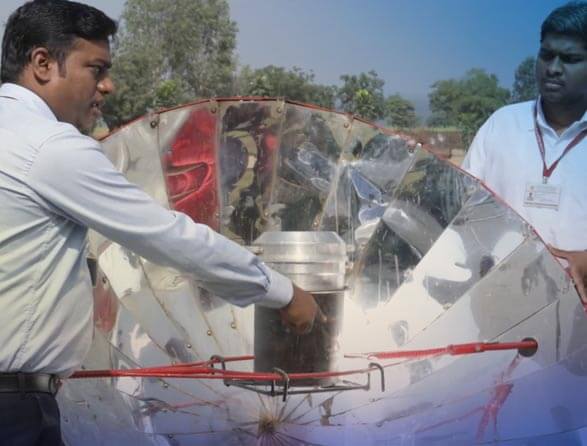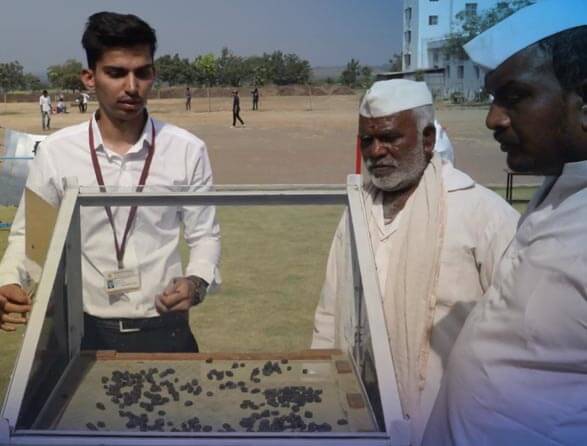In 2022, temperatures in India reached 115 degrees Fahrenheit (close to 46 degrees Celsius) – the highest on record in more than 100 years. Soaring temperatures do more than make life uncomfortable. They also add to an already difficult problem: spoilage that removes a percentage of India’s agricultural produce from the supply chain before it reaches consumers.
India leads the world in milk production and ranks second in producing vegetables and fruits. While India’s farmers are successful in achieving large production, preserving perishable produce long enough to get it to market can be a challenge, especially for milk, which spoils quickly in India’s heat. A portion of India’s dairy and vegetable produce is therefore wasted each year, due to a lack of cold storage and preservation options for rural farmers who lack access to India’s intermittently available power grid.
Losing crops to heat can be devastating for the 70% of rural households in India that depend on agriculture for their livelihoods. Without access to processing, refrigeration, storage facilities and transport methods, small farmers lose much of their crop and may have to sell what they can at a loss.
But the very sunlight that contributes to India’s food spoilage problem is now being tapped to solve it, with the invention of innovative, not-for-profit solar-powered solutions for refrigeration, pasteurization, food-drying and a host of other life-changing technologies for people in India and beyond.
How does solar power research benefit rural areas?
Four years ago, professors from N.K. Orchid College of Engineering & Technology in rural Solapur, India, partnered with La Fondation Dassault Systèmes – an organization dedicated to transforming the future of education and research – to help establish the Solar Research Centre.

“We realized that appliances that are powered by solar energy could transform the lives of those living and working in rural India,” said Dr. J.B. Dafedar, principal of the college. The centre’s equipment offers farmers a not-for-profit alternative to commercial solar-powered systems.
One such appliance developed with support from La Fondation Dassault Systèmes is a solar-powered milk pasteurization system.
“We have developed a community-based, solar-operated milk pasteurization system that can treat 100 liters (about 25 gallons) of milk a day,” said Dr. Shrinivas Metan, head of the college’s mechanical engineering department, and of the Solar Research Centre. “It’s a sustainable solution which farmers can use to pasteurize the milk at source.”
The Solar Research Centre also developed a solar-powered device for converting milk to mawa, evaporated milk solids used in making Indian sweets. Another innovative project: a compact solar-powered dehydration system for drying fruit and vegetables, including onions, potatoes, spinach, chili peppers and grapes, prolonging their shelf life.
“The solar-powered dehydration system has a capacity of 100 kilograms (about 200 pounds) per day,” Metan said, so one unit can serve multiple farms (an estimated 80% of India’s farmers have 2 hectares of land or less). “It is more compact than conventional dehydration systems and allows farmers and consumers to dry food in as little as 24 hours.”
As of 2020, India has about 8,200 cold-storage facilities for produce, but they are connected to the electricity grid, the Reuters story notes. “Farming advocates and NGOs say the energy costs of the units are too high for many small-scale farmers, while common power outages mean those who can afford to use them must often rely on expensive and polluting diesel generators as back-up.”
In Telangana, the Kattangur farmer producers group bought two commercial, solar-powered cold storage units with financial support from an NGO. The units – plus apps that show farmers the best times to sell their produce – have more than doubled their incomes, helping to pay for healthcare, education and technology and allowing them to reinvest in their farms.
Preventing household food waste with solar power
Significant global waste also occurs after food enters the supply chain, however, and India is no exception. The average Indian household wastes an estimated 50kg (about 110 pounds) of food every year, according to the the United Nations Environment Programme’s 2021 Food Waste Index Report. The UN report also outlines just how damaging this waste is to the environment – experts estimate that up to 10% of global greenhouse gas emissions are caused by rotting food waste.
To address the household waste problem, the Solar Research Centre developed a solar-powered refrigerator to store milk, medicine, vegetables and other groceries in homes where access to electricity from the grid is unreliable or non-existent.
“Thirteen percent of Indian households have no access at all to grid-connected electricity, and those that are connected can experience power cuts lasting up to 12 hours a day,” Metan said. “This means that perishable goods cannot be stored properly, and the food either reduces in nutritional value, contributing to malnutrition, or becomes toxic, resulting in food poisoning. It also means that medicines that need low temperatures end up being wasted.”
The university’s solar innovations could address these challenges. “Farmers can reduce spoilage and sell more produce, while reducing food wastage at the same time,” Metan said.

Unleashing solar-powered innovation
The solar-powered refrigeration, dehydration and pasteurization projects are just the start of innovations planned by the Solar Research Centre.
“In India, we get more than 300 clear solar days,” Dafedar said. “Therefore, there is ample scope to harness the full potential of solar energy in as many applications as possible.”
The centre selects projects and develops innovative products that best fit local requirements. Involving the university’s students in the centre’s projects also gives future engineers practical training in how to analyze and solve social challenges.
“Over the last four years, students have been in regular contact with local communities to understand their unique needs and work on projects that might help solve the most pressing challenges,” Dafedar said.
A solar-powered water pump and automatic water sprinkler helps India’s with irrigation, a major challenge. Less than 50% of the country’s agriculture is irrigated, but water shortages and diminishing groundwater resources are drying out their land.
Meanwhile, a solar tree – a structure that has solar panels as ‘leaves’ – absorbs light from the sun and converts it to electricity.
“Our solar tree is the largest of its kind in the world,” Metan said. “It uses 3% of the space of a conventional solar power plant and has 13.6 kWh capacity. Such a tree can meet all of the electricity requirements for six farmers’ houses and also run a solar-powered water pump. It could even be used to power apartment blocks in urban areas.”
The potential of solar trees hasn’t gone unnoticed. In 2022, addressing a post-budget webinar on “Energy for Sustainable Growth,” Prime Minister Narendra Modi urged India’s households to install solar trees to meet the nation’s increasing energy demands.
“We must shift to renewable energy,” the prime minister said. “Every household should develop its own solar tree that can contribute to saving up to 15% [of the] electricity of that house. It will not only be unique but will be environment-friendly. This will be [a] boon to the rural areas, where electricity scarcity is one of the major challenges.”
Training students as solar power researchers
The Solar Research Centre is making its mark – not just on government, farmers and local communities, but also on students who work on the projects. The centre gives them an opportunity to learn skills essential to developing sustainable solutions to current and future challenges.
“The basic intention of our course is to develop solar-ready engineers for the industry, as well as the society as a whole,” Metan said. “La Fondation Dassault Systèmes is helping us with skill development workshops and training programs for our students. It is helping them to get very good job opportunities, with nearly 100% placements for the students who graduated.”
Ijaj Sadique Daruwale, a student at N.K. Orchid, said his courses “helped me to attain tremendous knowledge in the solar domain, in fields such as mechanical, electrical, electronics and civil. I’m happy to be helping farmers; these interactions helped me to increase my self-confidence and my self-esteem. It also boosted my team skills and leadership. I would like to complete my Masters in renewable energy, and, in a few years, I would like to establish my own industry.”
The centre’s leadership also want to extend its reach to younger students.
“One of our future missions is to develop competency around solar energy among the youth across the country,” Metan said. “We’ll do this through training programs and by developing do-it-yourself kits so that they can harness solar energy to meet their own unique needs.”
The professors also want to set up a Solar Incubation Centre and a Solar FabLab, while also expanding the Solar Research Centre’s operations to cover not just rural India, but other developing nations in Africa and Asia.
“Solar innovation has the potential to transform lives – not only of farmers, but for those living in rural areas too,” Dafedar said. “I’m excited to see what we can achieve in the months and years to come.”

